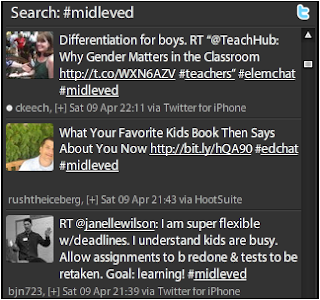Twitter is a way of expanding your professional network: those colleagues you bounce ideas off, people you get ideas from, people who share interesting articles/lessons/resources/websites. While I read and comment on blogs, what I was looking for was professional conversation – I found it on Twitter.
Here is a tiny part of a recent conversation from Twitter, a chat about homework in middle school. @name is the speaker, #midleved is the hashtag that pulls all these Tweets together.
- @mthman: Welcome back to the #midleved chat! I hope you had a good week in the classroom (or of spring break, like me!). Let's talk homework.
- @mthman: During the first week(s) of school, what do you tell your students/parents to expect via homework? #midleved
- @francesblo: How much time is reasonable for HW? #midleved
- @cybraryman1: My daily HW was for students to either read, watch or listen to the major news stories. We would discuss in class next day #midleved
- @cybraryman1: Years later a student in college thanked me for having do the current events assignment. He didn’t appreciate it then. #midleved
- @mthman: That depends...do you account for other teachers in the building also? RT @francesblo: How much time is reasonable for HW? #midleved
- @rushtheiceberg: #midleved Homework, in my class, is either extended time to finish classwork, or independent pract/refinement of close to mastered concepts
- @cybraryman1: [reply to] @mthman Good point. You don't want to overburden students #midleved
- @cybraryman1: The key is providing HW that is not just busy work. You want them to think #midleved
- @francesblo: In my school, daily HW in English, Math, less often other subjects #midleved
- @brianwyzlic [reply to]@francesblo 30 minutes/day seems about right, but we need to make sure we look cross-curricular, which is tough day-to-day #midleved
- @mthman: Do you "grade" HW or merely provide feedback? #midleved
Wouldn’t you like to have that kind of experience every week, a couple of times a week, maybe even every day?
There are side conversations in any chat (partly because people think/pause/write at different rates). Happily, since Twitter is a print medium, you can go back to read over what others have written to follow all the threads. And later, you can read the archive (Twitter scrolls down, with the most recent first, so you read the archive from the bottom up.) Here’s the archive for this discussion: http://midlevedchatarchive.pbworks.com/w/page/38845004/Midleved-chat-04082011
Some basic terminology using this recent #midleved chat as an example. The hashtag # shows this is a topic, and this topic can be followed on Twitter even if you don’t “follow” all the people who are part of that conversation (very useful when you’re starting out). The conversation goes on all week, and also during the scheduled “chat.” You can be part of the chat, or lurk (read the tweets during the chat, but don’t say anything), or scroll back through the tweets later, or read through the archive if there is an archive for that particular hashtag’s chats. There are many education-related chats and hashtags on Twitter, catalogued here by @cybraryman1 http://www.cybraryman.com/chats.html.
You can set up your free Twitter account and follow conversations from http://twitter.com, by using the search function, but it’s much easier to follow the conversations associated with a particular #hashtag by using a tool like http://www.tweetdeck.com/ (free software you download). Here, you get your regular Twitter stream (called Friends, the tweets of people you “follow”), any Mentions of your Twitter name (useful so you can respond – and you might miss these as the regular Twitter stream scrolls past), and Direct Messages (sent to you only). But the real strength is that you can add columns for the #hashtags that interest you. I find I’m more likely to check the #hashtags than my regular Twitter stream.
There are many, many wonderful resources about Twitter on the web. Here are a few to help you get started. Because these are conversations you want to be part of.
- Twitter Tutorial (including video) by Josh Stumpenhorst http://stumpteacher.blogspot.com/2010/12/twitter-tutorial.html
- Mom, this is how Twitter works by Jessica Hische: http://www.jhische.com/twitter/

No comments:
Post a Comment